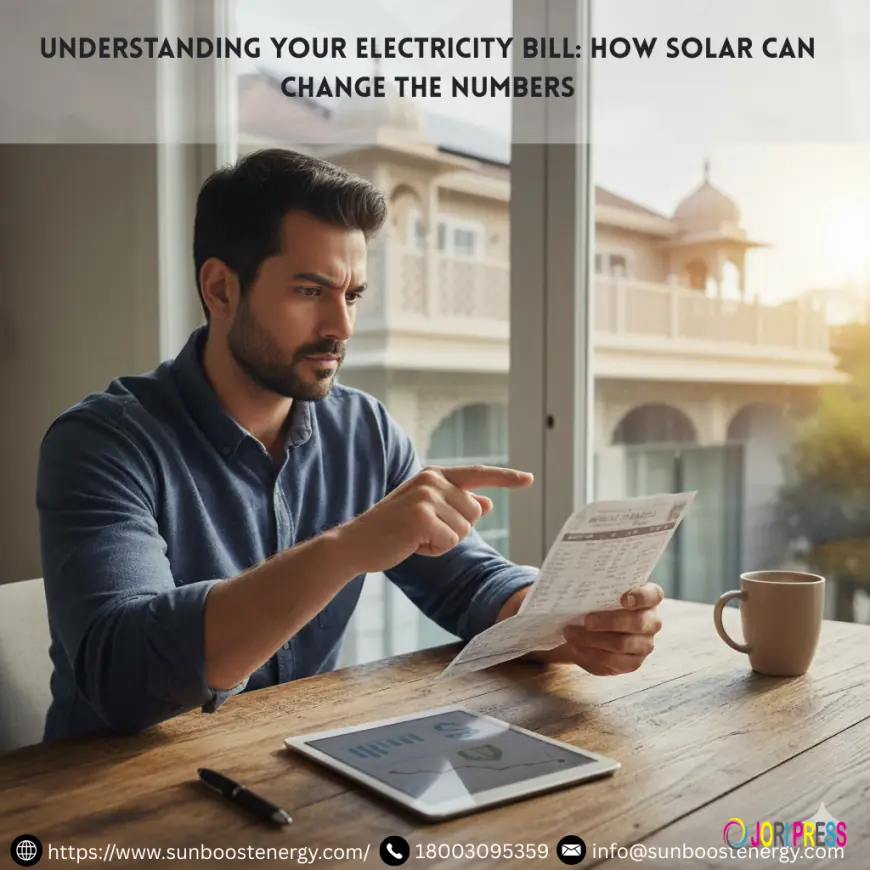Understanding Your Electricity Bill: How Solar Can Change the Numbers
Electricity bills can sometimes feel confusing—full of numbers, surcharges, and fluctuating rates.

Introduction
Electricity bills can sometimes feel confusing—full of numbers, surcharges, and fluctuating rates. But if you’ve noticed your monthly charges rising despite careful usage, you’re not alone. The truth is, energy costs are steadily increasing across India. And that’s exactly why more households are turning to rooftop solar panels to take control of their power consumption and long-term electricity bill savings.
Breaking Down Your Electricity Bill
Every electricity bill you receive is made up of several key components.
-
Energy Charges: Based on the number of units (kWh) you consume.
-
Fixed Charges: A constant fee depending on your connection type.
-
Taxes and Other Fees: State levies and electricity duty.
While you can manage your power usage to some extent, the rising base tariff and service-related charges are beyond your control. That’s where solar power begins to make a lasting difference.
How Solar Changes the Equation
When you install rooftop solar panels, your home starts generating clean electricity directly from sunlight. This reduces the units you draw from the grid, meaning your electricity bill savings start from the very first month.
With net metering, any excess power your system produces is sent back to the grid and credited to your bill. Over a year, these credits can offset most—if not all—of your energy charges.
The Real Cost Behind Solar Installation
One of the most common questions homeowners ask is about solar panel installation cost. The good news is, prices have dropped significantly over the past few years. On average, a residential solar system in India today costs between ₹65,000 to ₹80,000 per kW before subsidy.
With central government schemes like the PM Surya Ghar Muft Bijli Yojana, homeowners can now receive up to ₹78,000 in subsidy for above 3kW system—making rooftop solar more affordable than ever. And since most systems last 25 years or more, the return on investment remains exceptional—many users recover their cost within just 4 to 5 years.
Electricity Bill Savings That Add Up
Let’s look at a simple example.
If your household spends around ₹2,500 per month on electricity, that’s ₹30,000 a year. Over 10 years, it adds up to ₹3 lakh—without considering tariff hikes. A 5kW rooftop solar system can nearly eliminate this recurring expense, turning that money into long-term savings instead.
In short, you’re not just cutting costs; you’re creating financial stability for decades to come. And with expert installers like Sunboost Energy, you can be sure your system performs efficiently year after year.
More Than Just Savings
Switching to solar isn’t only about money—it’s also about independence and responsibility. You become less dependent on grid power, avoid surprise bill spikes, and contribute to a cleaner environment.
With Sunboost Energy, homeowners across Gujarat, Maharashtra, and beyond are embracing this change confidently. From premium panels to expert support, every installation reflects long-term quality and trust.
And unlike temporary rebates or discounts, solar savings grow stronger every year as conventional power rates continue to rise.
What's Your Reaction?
 Like
0
Like
0
 Dislike
0
Dislike
0
 Love
0
Love
0
 Funny
0
Funny
0
 Angry
0
Angry
0
 Sad
0
Sad
0
 Wow
0
Wow
0
















































